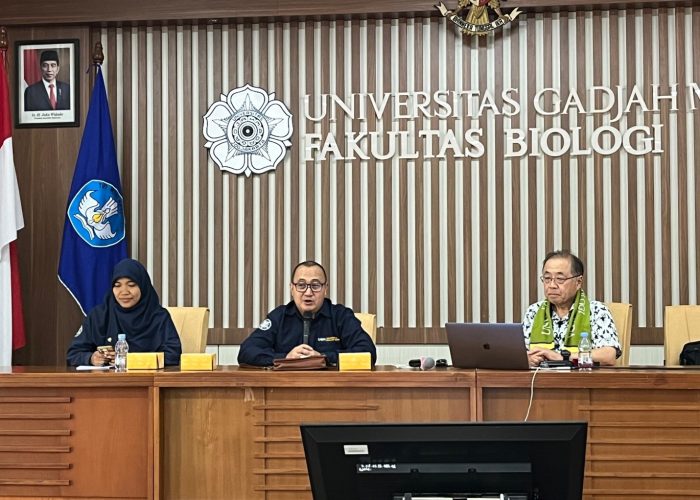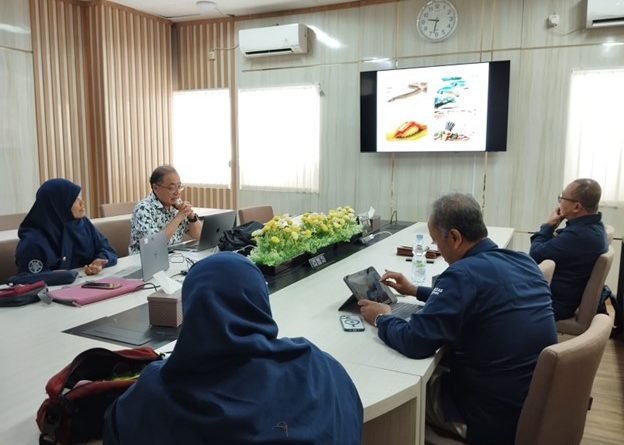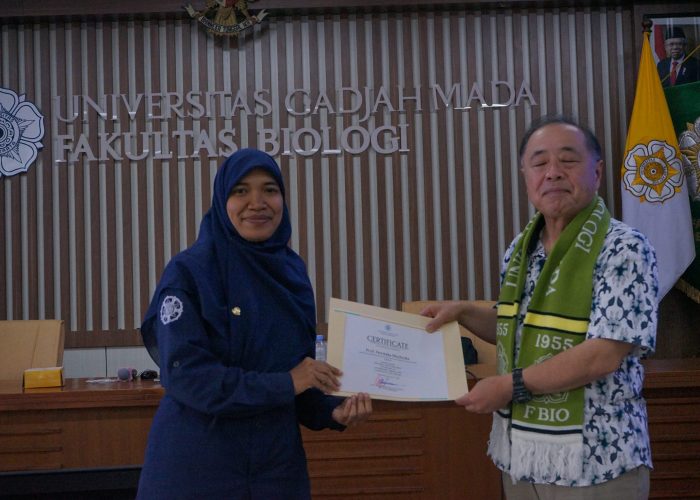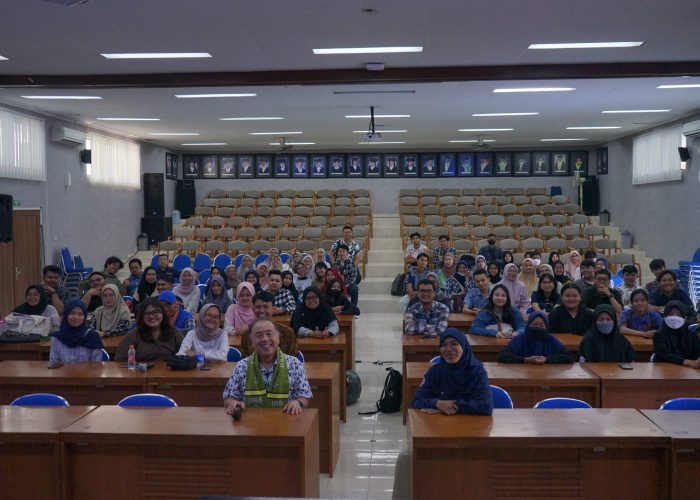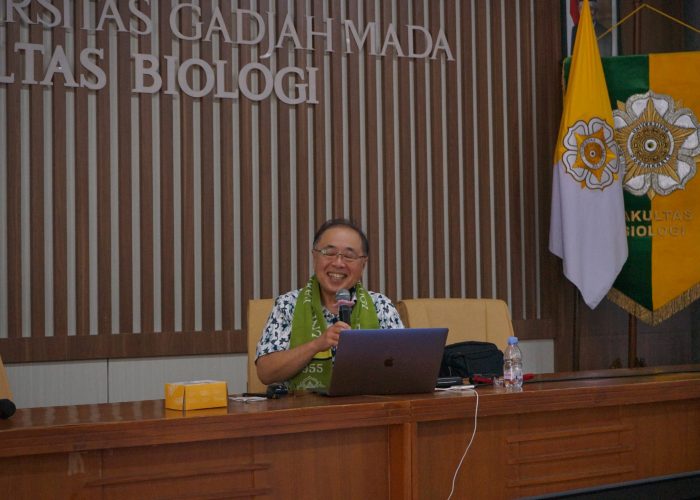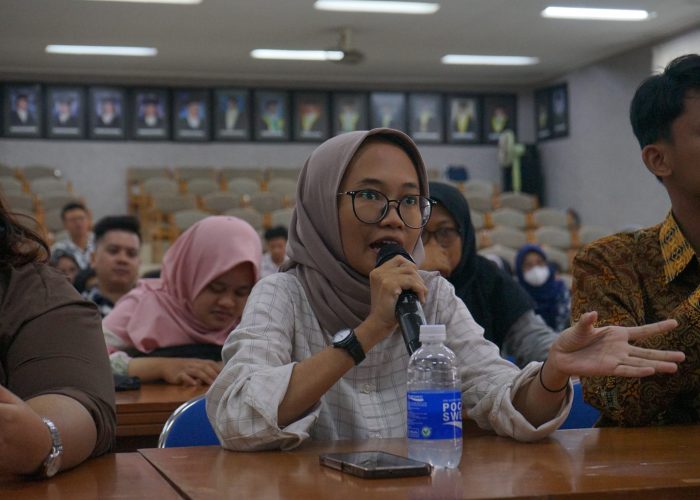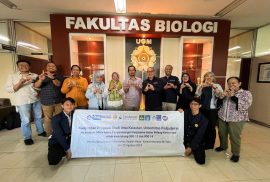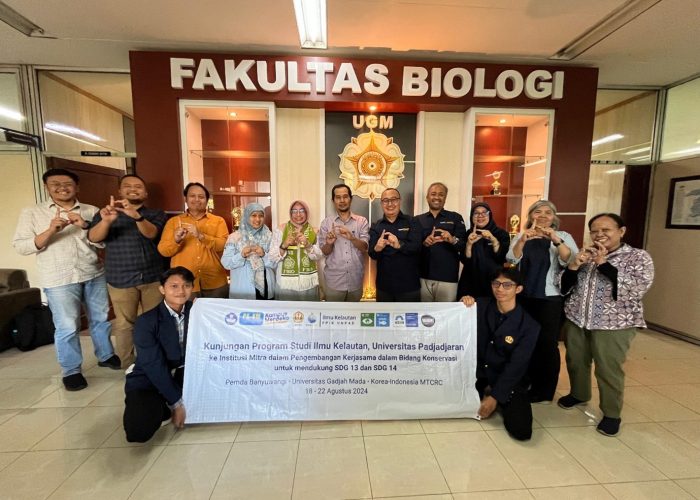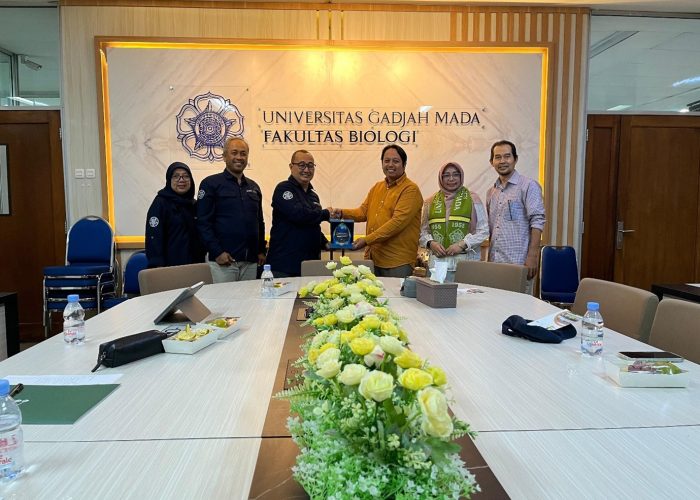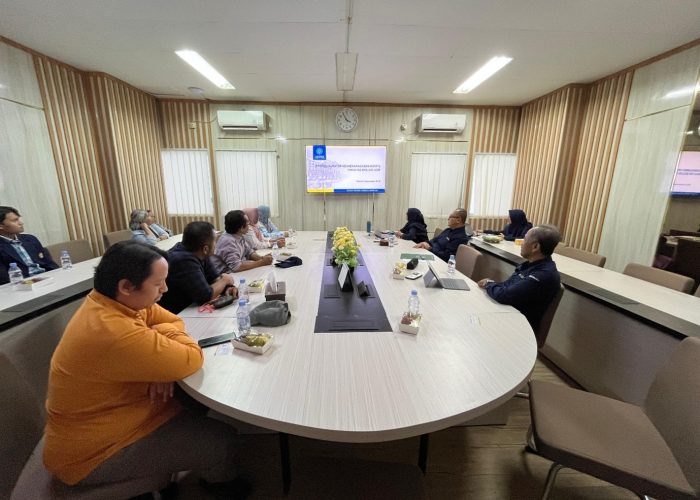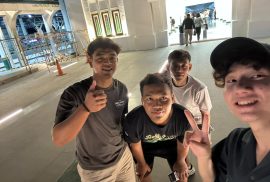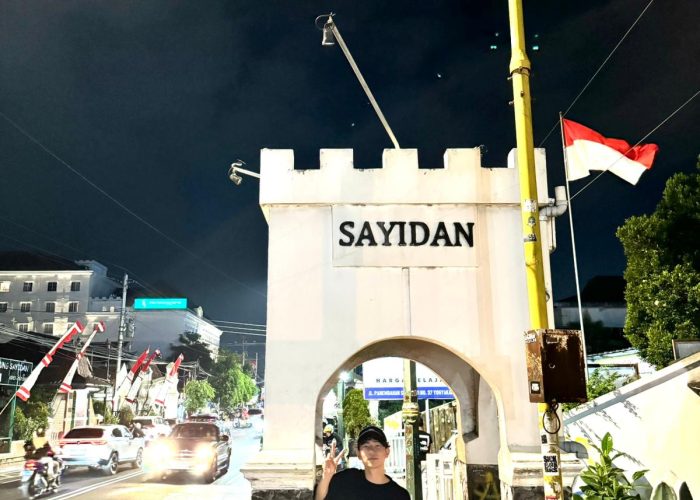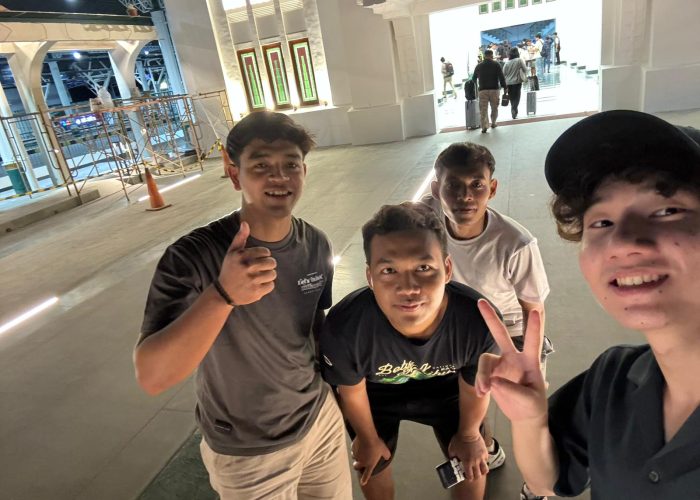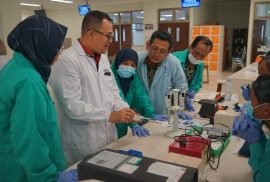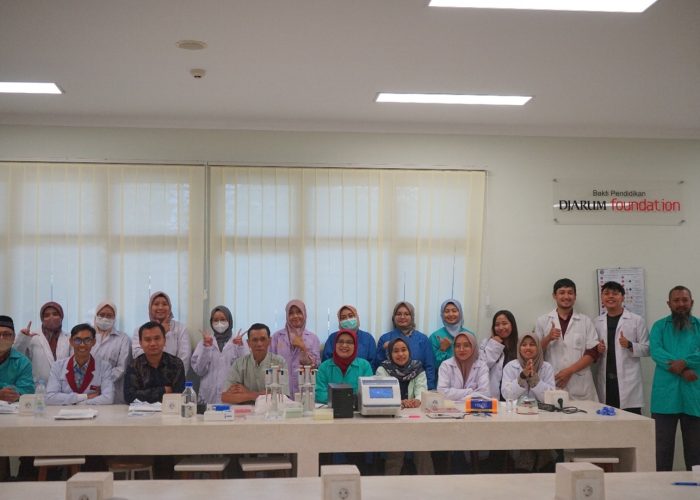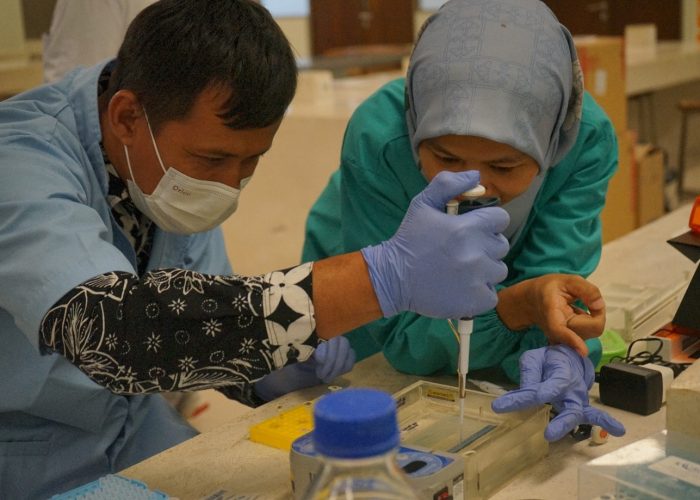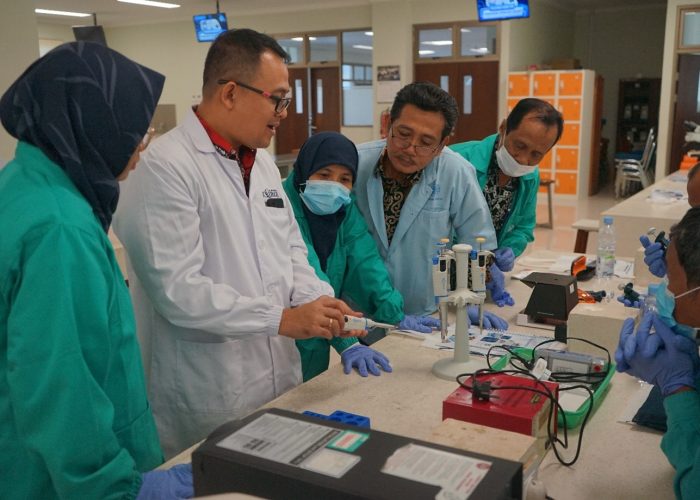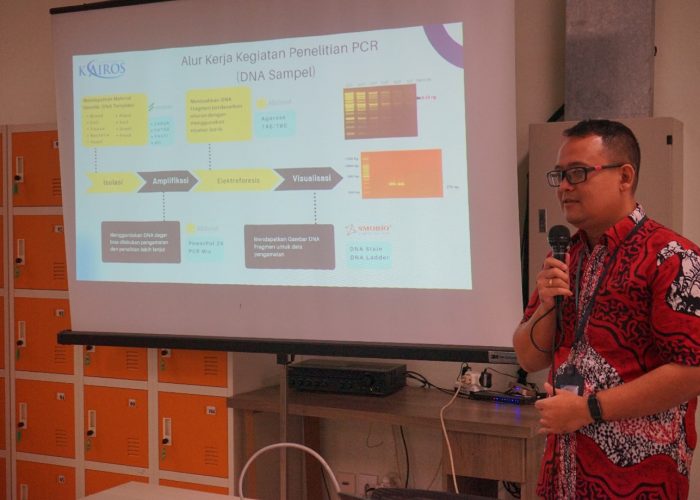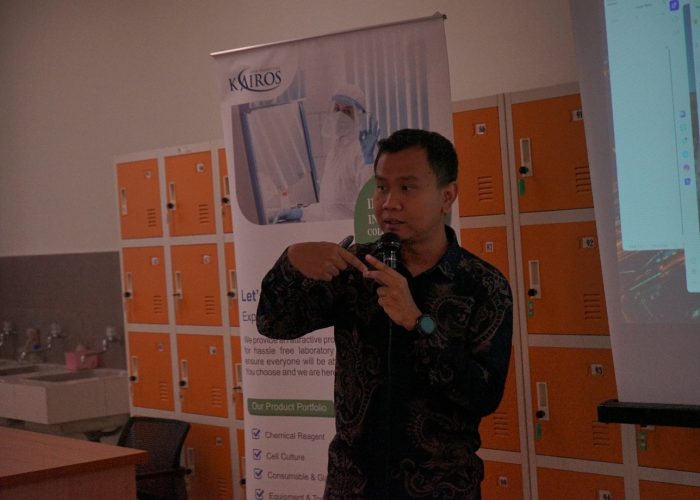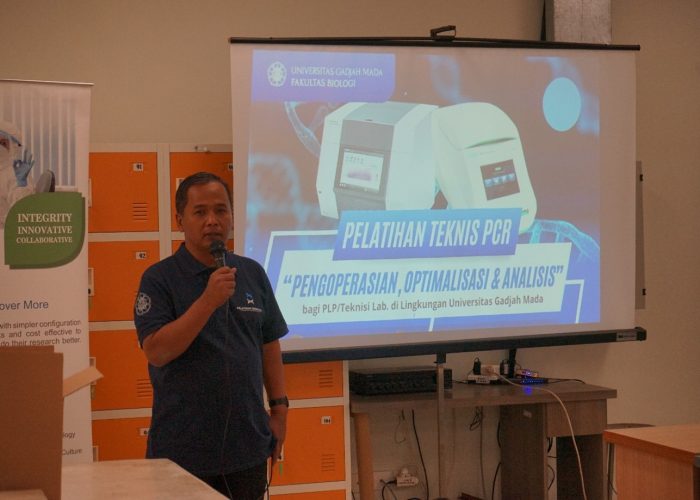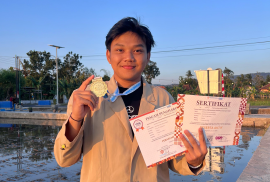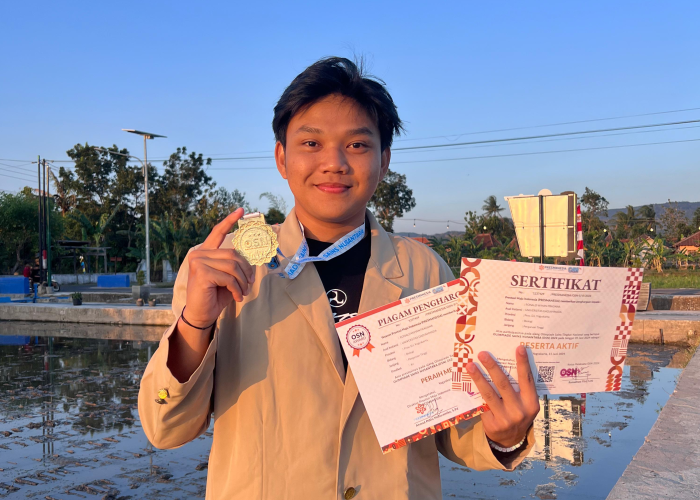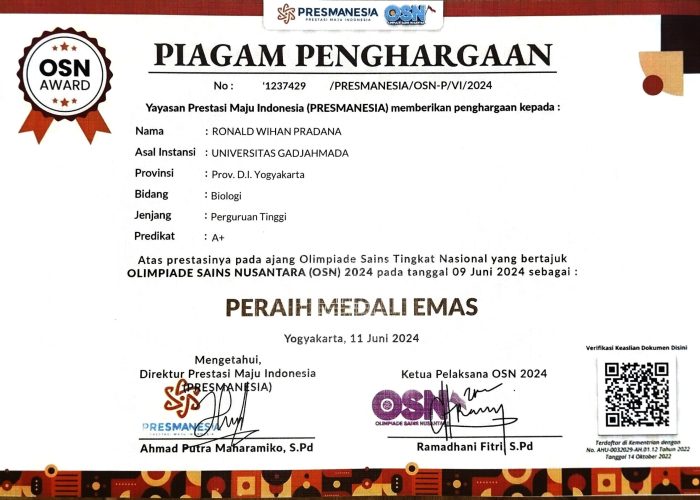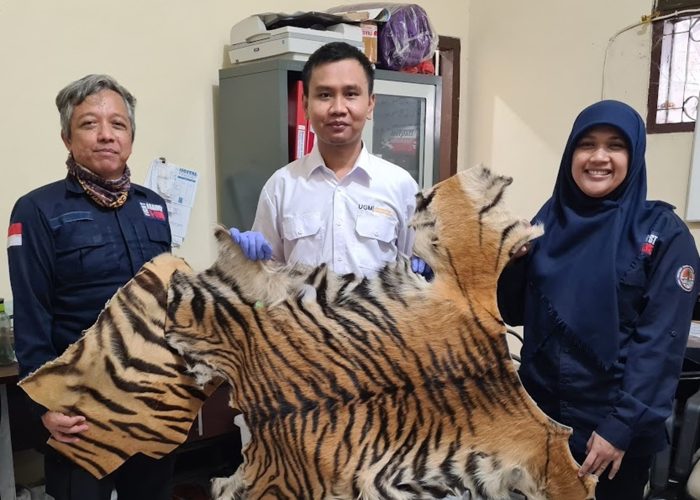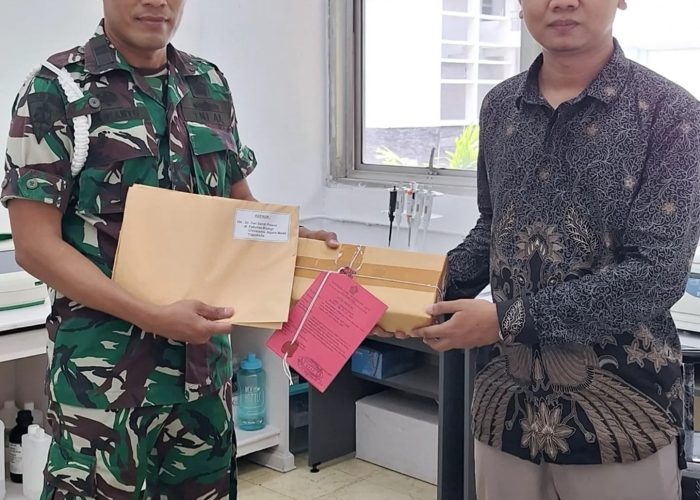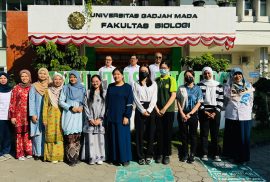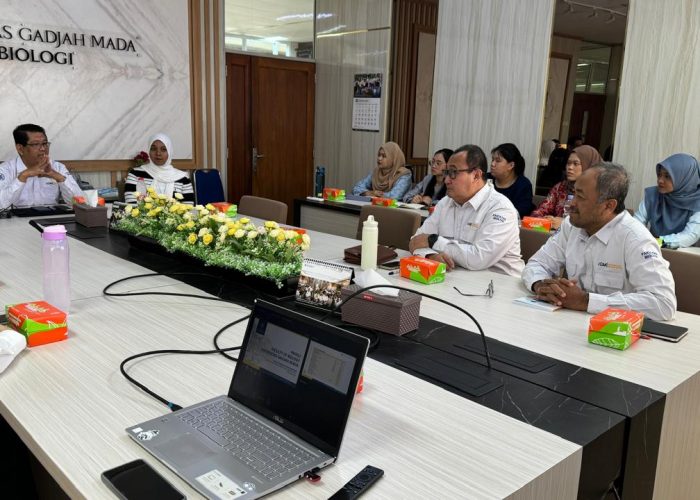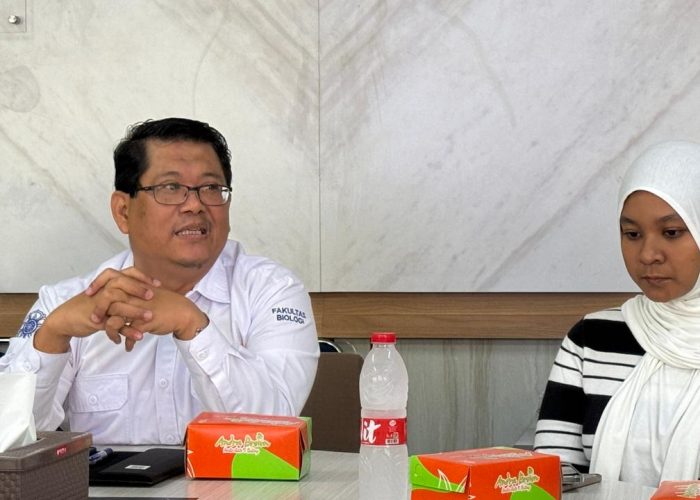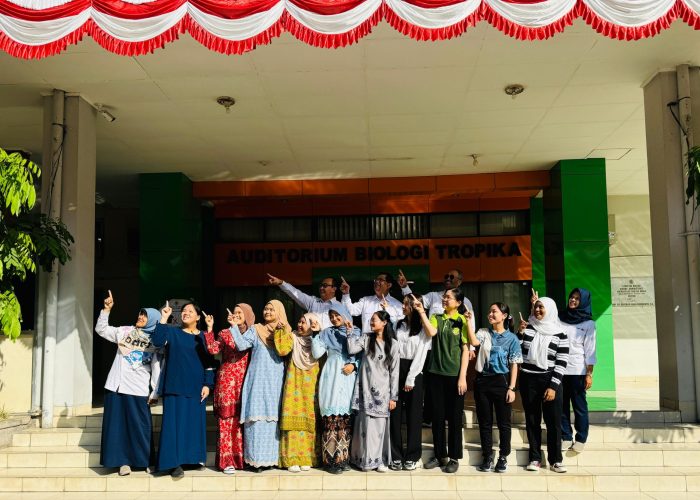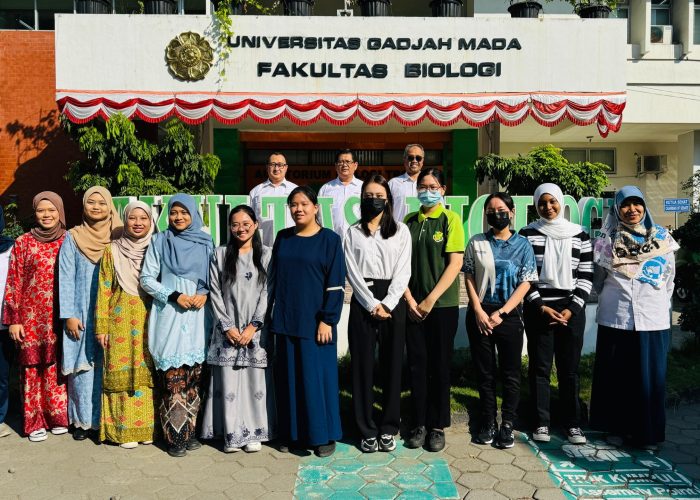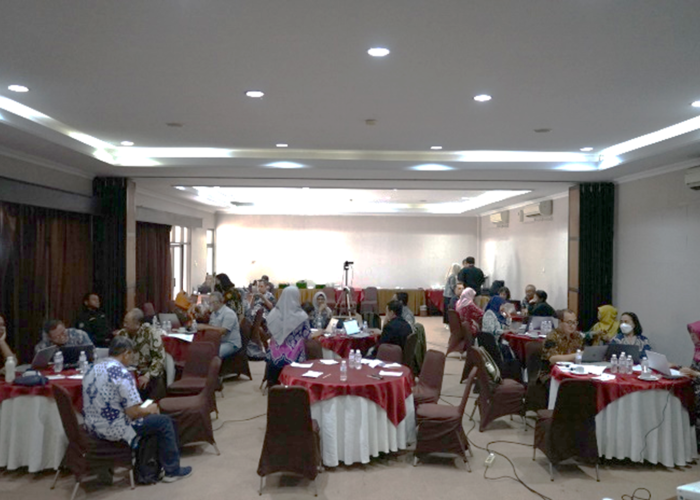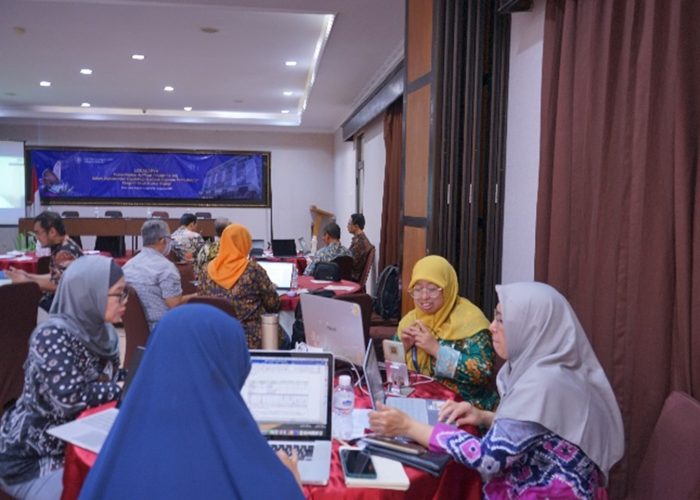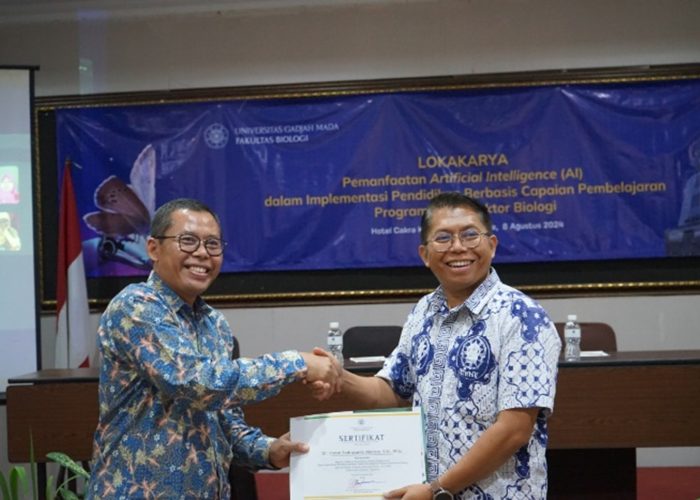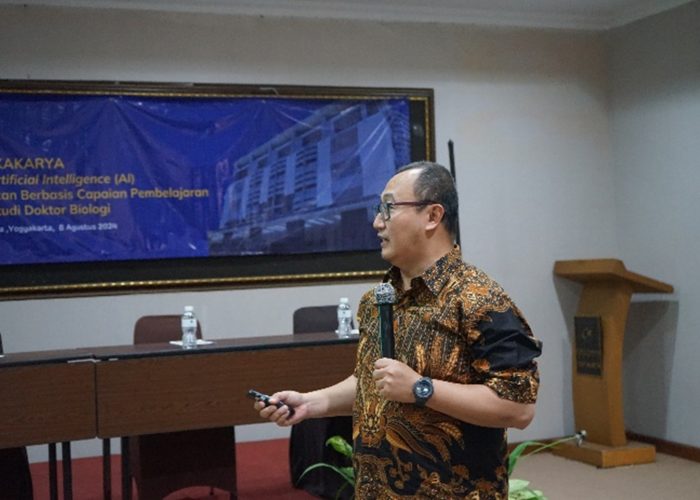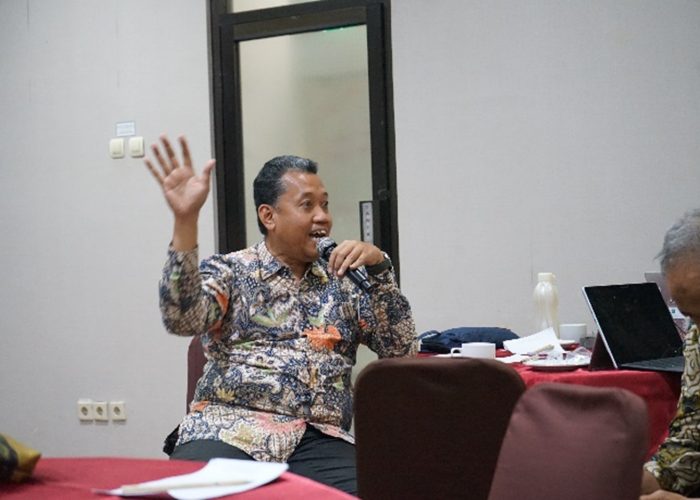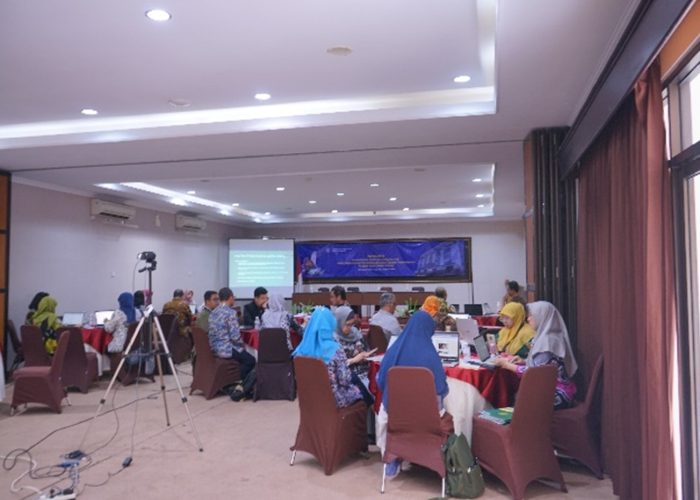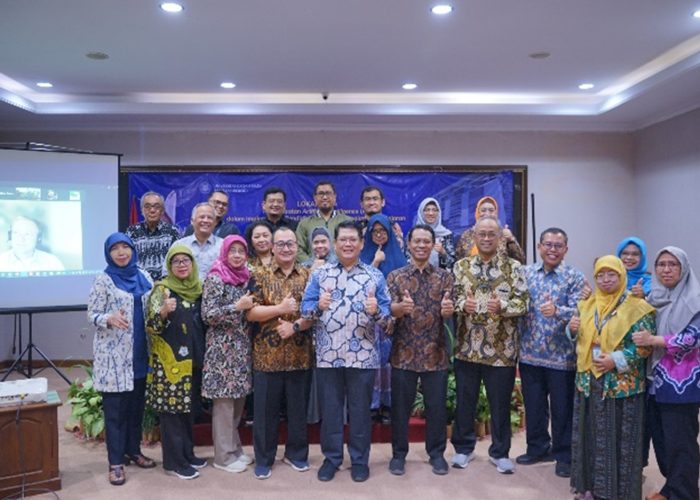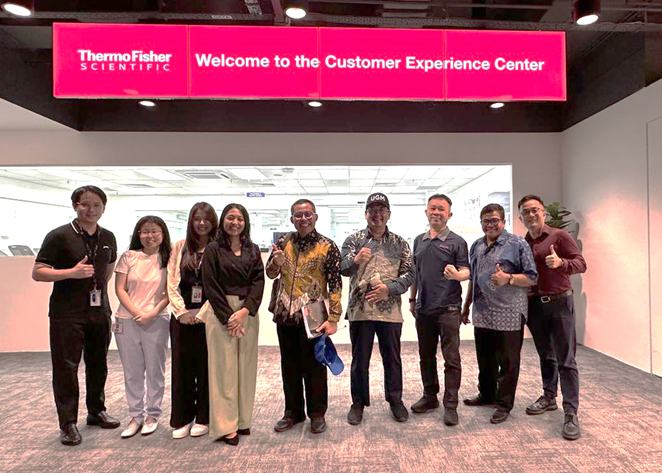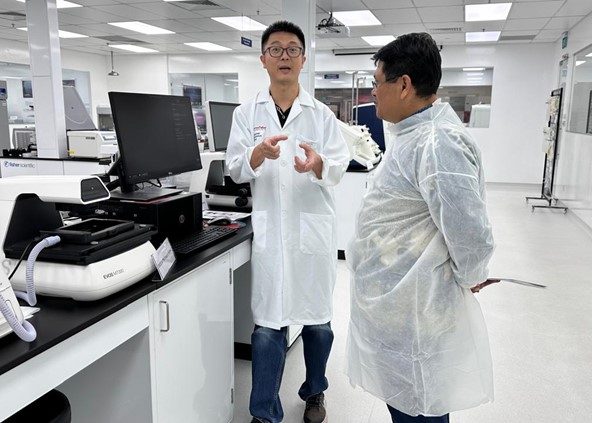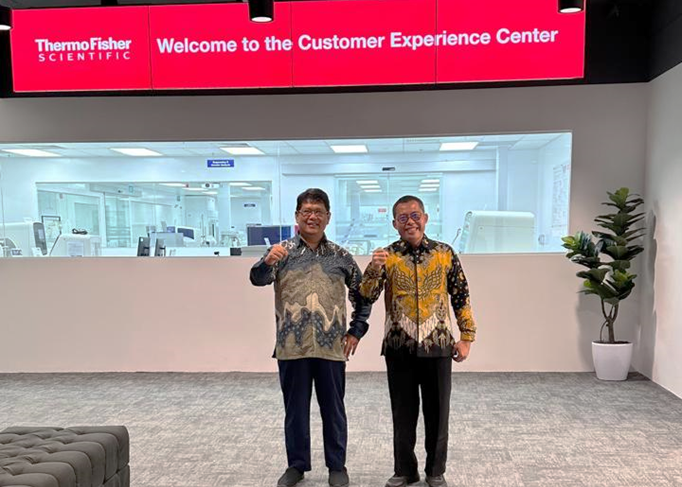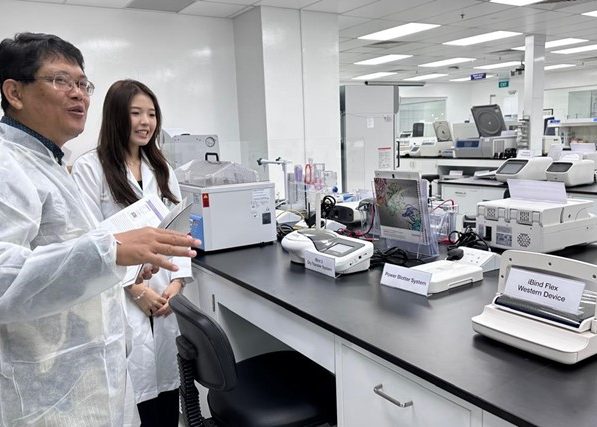Arsip:
SDG 4 : Provide Quality Education
Yogyakarta, 21 August 2024 – The Faculty of Biology, Universitas Gadjah Mada received a visit from Professor from Kyushu University Japan, Prof. Noritaka Mochioka. The visit was received in the KPTU Meeting Room, Faculty of Biology UGM by Dr. Eko Agus Suyono, M.App.Sc. as Vice Dean for Research, Community Service, Collaboration and Alumni Affairs, Dr. Bambang Retnoaji, M.Sc. as Vice Dean for Academic and Student Affairs, as well as Lecturers from the Animal Development Structure Laboratory, Faculty of Biology, Nur Indah Septriani, M.Sc., Ph.D., and Zuliyati Rohmah, Ph.D.
This visit is the second time Prof. Noritaka Mochioka visited the Faculty of Biology UGM after 2017. He was also present as a guest lecturer on several previous occasions. During this visit, Prof. Noritaka Mochioka expressed his enthusiasm for developing research related to eel with Nur Indah Septriani, Ph.D. who is also a graduate of Kyushu University, Japan.
Dr. Eko welcomed Prof. Noritaka Mochioka. During the visit, various cooperation initiatives were presented that could be collaborated with Kyushu University, including student exchanges up to double degrees. Previously, the Faculty of Biology UGM also established good cooperation with a student exchange scheme through the Sakura Science Program with Yamagata University, Japan.
Prof. Noritaka Mochioka also had the opportunity to give a public lecture, taking place in the Tropical Biology Auditorium, UGM Faculty of Biology, moderated by Nur Indah Septriani, Ph.D. He delivered a public lecture entitled “Life History and Conservation of Freshwater Eel”. Dr. Eko as Vice Dean for Research, Community Service, Collaboration and Alumni Affairs, was also present to give an introductory speech at the public lecture.
Prof. Noritaka Mochioka started the lecture by explaining how marine products have become an important commodity for Japanese community. Both marine products that are commonly consumed and those that are less common, such as pufferfish, are processed to make them suitable for consumption. He focuses his research on eel or eel or what is commonly known as unagi. Prof. Noritaka Mochioka highlighted the diversity, distribution of eels in Japan and the world and their high nutritional quality, but the price is not yet affordable. He focuses on developing eels that are highly nutritious but can be reached by the wider community.
The public lecture was followed by a question-and-answer session. Participants were very enthusiastic about attending the lecture and were interested in learning about eels. It is hoped that this public lecture can become a forum for inspiration for collaboration as well as strengthening collaborative relations, especially between the Faculty of Biology UGM and Kyushu University Japan in the future, in line with the commitment to the Sustainable Development Goals for increasing inclusive education and expanding cooperation (SDG 4 and 17) at the same time. contribution to the preservation of marine ecosystems (SDG 14) and the development of functional food that is affordable for communities (SDG 12).
Yogyakarta, August 21, 2024 – The Faculty of Biology at Universitas Gadjah Mada (UGM) welcomed a visit from the Faculty of Fisheries and Marine Sciences (FPIK) at Universitas Padjajaran (Unpad) for a benchmarking activity focused on the Biodiversity Curator Professional Study Program (PKKH). The visit took place on Wednesday, August 21, 2024, from 3:00 – 4:15 PM, in the KPTU Meeting Room at the Faculty of Biology, UGM.
The delegation from FPIK Unpad, consisting of 6 lecturers and 4 students, was warmly received by the leadership of UGM’s Faculty of Biology. The FPIK Unpad representatives included Dra. Sri Astuty, M.Sc.; Dr. Yeni Mulyani, S.Si., M.Si.; Dr. H. Sunarto, S.Pi., M.Si.; Buntora Pasaribu, S.Pi., M.Sc., Ph.D.; Dr. Eri Bachtiar, S.Si., M.Si.; and Dr. Yuniarti, MS, S.Pi., M.Si.
On behalf of UGM’s Faculty of Biology, the event was attended by Dr. Bambang Retnoaji, M.Sc., Vice Dean for Academic and Student Affairs; Dr. Eko Agus Suyono, M.App.Sc., Vice Dean for Research, Community Service, Cooperation, and Alumni; as well as Rina Sri Kasiamdari, S.Si., Ph.D., Head of the Biodiversity Curator Professional Program. Additionally, two staff members from UGM’s P2MKSA Unit were also present.
The visit aimed to study and gain a deeper understanding of the Biodiversity Curator Professional Program, which has recently been established at UGM’s Faculty of Biology. During the meeting, both parties engaged in discussions about the curriculum, program management, and potential collaboration opportunities in academic and research fields (SDGs 4).
In his opening remarks, Dr. Eko stated, “We warmly welcome our colleagues from FPIK Unpad and hope that this benchmarking activity will serve as a starting point for closer collaboration in the future, particularly in the development of programs focused on biodiversity conservation and management (SDGs 14 and SDGs 15).”
On the other hand, Dr. Yuniarti, Head of Bachelor Program Study the FPIK Unpad delegation, expressed her gratitude for the warm reception from UGM’s Faculty of Biology. She also expressed her hope that the results of this benchmarking activity could be applied in the development of programs at FPIK Unpad.
The visit concluded with the exchange of souvenirs between the two institutions and a group photo session as a memento. This visit is expected to strengthen the synergy between the two institutions in advancing education and research in the field of biodiversity in Indonesia (SDGs 16 and SDGs 17).
Yogyakarta, August 21, 2024 – The Faculty of Biology at Universitas Gadjah Mada (UGM) is honored to host Kantaro Okada, an exchange student from Japan whose academic journey reflects a deep commitment to environmental sustainability and global learning. Kantaro’s background in International Relations and his passion for environmental science have motivated him to participate in the student exchange program at UGM, where he is currently pursuing studies in Biology and Environmental Science.
Kantaro recognizes the challenges that come with living in Yogyakarta, including language barriers and cultural differences. However, he views these challenges as opportunities for growth, which have made him more open-minded and eager to learn. His ability to adapt and embrace a new environment is a testament to the resilience often seen in exchange students.
Supported by his family, Kantaro expressed gratitude for the unwavering encouragement from his father, mother, and younger brother. Their support has been instrumental in his decision to pursue studies abroad, reinforcing the importance of family in educational endeavors.
Kantaro’s hobbies, including watching Western movies and dramas and listening to Western music, have not only provided leisure but have also enhanced his English language skills. These interests have contributed to his broader understanding of different cultures, aiding his adjustment to life in Yogyakarta.
What sets Kantaro apart is his unconventional academic path. Despite majoring in International Relations in Toyo University Japan, his decision to join the Faculty of Biology at UGM is driven by a personal mission to combat deforestation. His father owns a furniture shop that uses Indonesian trees, which has made Kantaro acutely aware of the environmental impact of deforestation. Determined to contribute to nature conservation, Kantaro is pursuing biology to gain a deeper understanding of natural systems and explore sustainable practices.
During his time at UGM, Kantaro has expressed a particular interest in courses on Plant Biosystematics and Plant Structure and Secretory Tissue Products. He aims to gain a comprehensive understanding of biological sciences from a global perspective, which will enable him to make informed decisions that align with environmental sustainability.
Kantaro Okada’s academic journey at UGM aligns with several of the United Nations Sustainable Development Goals (SDGs), particularly:
Kantaro’s dedication to education and environmental conservation serves as an inspiration to his peers and underscores the critical role that international exchange programs play in advancing the SDGs. His journey highlights the importance of global learning and interdisciplinary approaches in addressing pressing environmental challenges.
On August 13, 2024, the Faculty of Biology UGM held a training on PCR technique at the Teaching Laboratory in Building B of the Faculty of Biology. It was attended by 30 participants and aimed to enhance their basic literacy skills in molecular biology while providing essential knowledge of modern technologies in the field. This initiative aligns with the Sustainable Development Goals (SDGs), promoting quality education and ensuring access to fundamental services in scientific training.
The event opened by Mulyanto S.T., M.M., Head of the Administration Office of the Faculty of Biology UGM and committee chair. In his opening remarks, Mulyanto emphasized the importance of this training to enhance technical skills and research within the Faculty of Biology, which would advance the quality of laboratory facilities and support research services for faculty and students.
The training featured speakers Dr. Dwi Sendi Priyono, S.Si., M.Si., a lecturer at the Faculty of Biology UGM, and apt. Ign. Adi Kurniawan, M.Farm., Director of PT Kairos Jaya Sejahtera. They shared insights on the fundamental principles of PCR, a crucial technique in genetic research and diagnostics. The training included theoretical and practical sessions on operating PCR machines, optimizing reaction conditions, and effectively analyzing results. This hands-on experience intended to equip laboratory technicians with the skills to stay at the forefront of biotechnology and health advancements while improving the technical competencies needed for diverse research activities.
This training represents a significant step toward enhancing basic literacy skills and education in biotechnology, aligning with the commitment of the Faculty of Biology to provide skilled laboratory technicians ready to face future challenges. The event ran smoothly for a day and was followed by independent work assignments at each participant’s laboratory.
On August 13, 2024, the Faculty of Biology UGM held a training on PCR technique at the Teaching Laboratory in Building B of the Faculty of Biology. It was attended by 30 participants and aimed to enhance their basic literacy skills in molecular biology while providing essential knowledge of modern technologies in the field. This initiative aligns with the Sustainable Development Goals (SDGs), promoting quality education and ensuring access to fundamental services in scientific training.
The event opened by Mulyanto S.T., M.M., Head of the Administration Office of the Faculty of Biology UGM and committee chair. In his opening remarks, Mulyanto emphasized the importance of this training to enhance technical skills and research within the Faculty of Biology, which would advance the quality of laboratory facilities and support research services for faculty and students.
The training featured speakers Dr. Dwi Sendi Priyono, S.Si., M.Si., a lecturer at the Faculty of Biology UGM, and apt. Ign. Adi Kurniawan, M.Farm., Director of PT Kairos Jaya Sejahtera. They shared insights on the fundamental principles of PCR, a crucial technique in genetic research and diagnostics. The training included theoretical and practical sessions on operating PCR machines, optimizing reaction conditions, and effectively analyzing results. This hands-on experience intended to equip laboratory technicians with the skills to stay at the forefront of biotechnology and health advancements while improving the technical competencies needed for diverse research activities.
This training represents a significant step toward enhancing basic literacy skills and education in biotechnology, aligning with the commitment of the Faculty of Biology to provide skilled laboratory technicians ready to face future challenges. The event ran smoothly for a day and was followed by independent work assignments at each participant’s laboratory.
A student from the Faculty of Biology Universitas Gadjah Mada, Ronald Wihan Pradana (Biology 2021), has achieved a remarkable achievement by winning a Gold Medal at the Nusantara Science Olympiad (OSN). The 2024 OSN, organized by the PRESMANIA Foundation (Prestasi Maju Indonesia), is a prestigious national competition that saw participation from 1,000 students representing 100 universities across Indonesia.
Ronald’s success is a testament to the rigorous preparation and innovative approach he brought to the competition, which impressed the judges and brought great honor to his alma mater. His victory was attributed to the unwavering support of his mentors, faculty, and university. “This accomplishment proves that our students possess exceptional qualities and can compete at national and international levels” Prof. Dr. Budi Setiadi Daryono, M.Agr.Sc., Dean of the Faculty of Biology UGM stated.
Ronald began his preparation in January 2024, guided by Dwi Umi Siswanti, S.Si., M.Sc. He conducted in-depth research on “Biofertilizer as a Bioremediation Agent for Zinc (Zn) Residue in Chili Plant (Capsicum Annuum L.) Fields Post-Application of Inorganic Fungicides on a Field Scale.” In addition to his research, Ronald participated in various training sessions and seminars to enhance his skills.
“The journey to OSN was not easy. I faced difficulties in understanding some complex topics in biology, a fundamental and highly intricate science that encompasses multiple aspects, including humans, plants, animals, the environment, microbiology, and more. However, with the support of my friends and lecturers, I was able to overcome these challenges,” Ronald shared.
[Author: Ronald Wihan Pradana]
Yogyakarta – Dr. Dwi Sendi Priyono, a lecturer from the Faculty of Biology at Universitas Gadjah Mada (UGM), has made a significant contribution by becoming the first and only full member from Indonesia in the Society for Wildlife Forensic Science (SWFS). SWFS is an international organization dedicated to supporting and promoting wildlife forensic science and providing competency certification for wildlife forensic scientists. Dr. Sendi is also certified in Wildlife Forensic Testing (https://www.wildlifeforensicscience.org/swfs-membership-2/?paged=22).
Indonesia is known for its rich biodiversity, unfortunately it faces serious challenges in wildlife crime. The absence of a full member from Indonesia in SWFS was previously a concern, given the urgency in addressing wildlife crime cases that frequently occur in the country. Dr. Dwi Sendi Priyono, who also serves as the Head of the Animal Systematics Laboratory in the Tropical Biology Department at UGM, has significantly contributed to various wildlife forensic cases in Indonesia. He has assisted in forensic DNA testing in multiple cases, including suspected illegal trade of rare animal body parts such as tigers, elephants, orangutans, and Komodo dragons. Among his notable contributions are DNA testing on suspected dugong bones by the Indonesian Navy’s Main Base, DNA testing of Komodo dragon samples by the East Java Regional Police, and training on wildlife DNA forensics held in various locations across Indonesia.
Dr. Dwi Sendi Priyono’s achievement as a full member of SWFS is also highly relevant to the efforts towards achieving the Sustainable Development Goals (SDGs), particularly Goal 15, “Protect, Restore, and Promote Sustainable Use of Terrestrial Ecosystems.” His expertise in wildlife forensics supports the conservation of endangered species and the prevention of wildlife crimes, which are crucial elements for global biodiversity conservation.
It hoped that this accomplishment will pave the way for more scientists from Indonesia to participate in international organizations like SWFS and enhance collective efforts to combat wildlife crime at both the national and global levels.
Yogyakarta, August 12, 2024 – The Faculty of Biology at Universitas Gadjah Mada (UGM) warmly welcomed student exchange participants for the 2024 odd semester in a ceremony held today. This year, the Faculty is hosting 6 students from Universiti Tun Hussein Onn Malaysia (UTHM), 1 student Universitas Brunei Darussalam, and 1 student Toyo University, Japan. The event underscores UGM’s commitment to fostering international academic collaboration and cultural exchange.
The event was attended by esteemed faculty members, including the Dean, Prof. Dr. Budi Setiadi Daryono, M.Agr., Sc., Vice Dean for Academic and Student Affairs, Dr. Bambang Retnoaji, M.Sc., and Vice Dean for Cooperation, Research, Community Service, and Alumni, Dr. Eko Agus Suyono, M.App., Sc. The presence of these key figures highlighted the significance of the student exchange program in enhancing academic excellence and promoting cross-cultural understanding.
In his opening remarks, Dean Prof. Dr. Budi Setiadi Daryono expressed his enthusiasm for the program, emphasizing that these exchanges are vital for broadening students’ horizons and equipping them with the global competencies necessary for their future careers. He also stressed the importance of such programs in contributing to the achievement of the Sustainable Development Goals (SDGs), particularly in the areas of Quality Education (SDG 4), Reduced Inequalities (SDG 10), and Partnerships for the Goals (SDG 17).
Vice Dean Dr. Bambang Retnoaji highlighted the academic benefits of the exchange program, which allows students to gain unique insights into tropical biodiversity, conservation efforts, and sustainable development practices in Indonesia. Meanwhile, Dr. Eko Agus Suyono emphasized the Faculty’s commitment to strengthening international cooperation through research and community service, in line with UGM’s vision of becoming a world-class university.
The student exchange participants will engage in various academic and extracurricular activities during their stay, including lectures, field studies, and cultural immersion experiences. These activities are designed to provide a comprehensive understanding of Indonesia’s rich biological diversity and the challenges and opportunities in sustainable development.
Thursday, August 8, 2024 – The Faculty of Biology Universitas Gadjah Mada held a workshop on Artificial Intelligence (AI) in the implementation of outcome-based education for Doctor in Biology Study Program. This event held in hybrid manner, at the Cakra Kusuma Hotel and via zoom meeting. Attended by all lecturers for the doctoral program, the workshop aimed to enhance the quality of education within the Faculty of Biology UGM.
In his opening remarks, the Dean of the Faculty of Biology UGM, Prof. Dr. Budi Setiadi Daryono, M.Agr.Sc., emphasized the importance of understanding Artificial Intelligence (AI) to support the teaching and learning process. The event continued with a presentation delivered by Prof. Luke Daniels, Ph.D., from The College of Idaho, on Development of Doctoral Program to Address Global Challenges. Prof. Daniels highlighted the need for doctoral graduates to be innovative in their fields. Therefore, curriculum development must consider the strengths that already possessed by the university while also keeping pace with developments such as the use of Artificial Intelligence (AI) to enhance the quality of learning and research.
The 2nd session was delivered by the Director of Directorate of Academic Studies and Innovation (DKIA) UGM, Dr.Agr.Sc. Ir. Hatma Suryatmojo, S.Hut., M.Si., IPU. ASEAN Eng. The presented topic was “Utilizing Artificial Intelligence in Learning and Research”. Dr. Hatma commended the quick response of the Faculty of Biology to the advancements of the AI era in supporting educational and research, as well as community services.
In his presentation, Dr. Hatma highlighted the increasingly indispensable role of AI in teaching and learning activities. He explained AI can be effectively integrated to enhance efficiency and effectiveness. A point he emphasized was the role of lecturers in overseeing the use of AI to ensure its relevance. Lecturers obliged to stimulate and encourage students to understand and deepen their knowledge through further discussion. The Vice Dean, Dr. Eko Agus Suyono, M.App.Sc., added that the Faculty of Biology UGM has already implemented the latest technology in drafting the Strategic Plan (Renstra) 2023.
The next session was conducted by the Head of the Sub-Directorate of Academic Studies DKIA UGM, Dr. Irwan Endrayanto, S.Si., M.Sc., on Simaster for Course Plan (RPKPS) and Portfolios. As an introduction, Dr. Irwan explained the standards of the learning process at Universitas Gadjah Mada, emphasizing the importance of assessment in the learning process.
Effective and efficient assessment requires well-structured RPKPS. Technology, such as the Simaster plays a role in facilitating the creation and management of the document. During this session, Dr. Irwan was assisted by Andri Andreas Priyanto and Muhammad Lathif Febriyanto, S.Pd., who guided lecturers through the practical process of filling out and preparing RPKPS and portfolios using the Simaster.
This workshop demonstrates the Faculty of Biology UGM’s commitment to enhancing the quality of education and the competence of lecturers in implementing the Tri Dharma of higher education particularly in the Doctoral Program, align with the Sustainable Development Goals (SDGs) on providing quality and inclusive education (SDGs No. 4).
Effective and efficient assessment requires well-structured RPKPS. Technology, such as the Simaster plays a role in facilitating the creation and management of the document. During this session, Dr. Irwan was assisted by Andri Andreas Priyanto and Muhammad Lathif Febriyanto, S.Pd., who guided lecturers through the practical process of filling out and preparing RPKPS and portfolios using the Simaster.
This workshop demonstrates the Faculty of Biology UGM’s commitment to enhancing the quality of education and the competence of lecturers in implementing the Tri Dharma of higher education particularly in the Doctoral Program, align with the Sustainable Development Goals (SDGs) on providing quality and inclusive education (SDGs No. 4).
Singapore, August 7, 2024 – In an effort to enhance the quality of education and research, the Faculty of Biology UGM, represented by the Dean of the Faculty of Biology UGM, Prof. Dr. Budi S. Daryono, M.Agr.Sc., and the Vice Dean for Finance, Assets, and Human Resources, Dr. Slamet Widiyanto, S.Si., M.Sc., conducted a visit to Singapore. The visit aimed to establish collaboration and demonstrate laboratory equipment at the Thermo Fisher Scientific Customer Experience Center (CEC) in Singapore. The event, which took place from August 5 to 6, 2024, was organized by PT Nutrilab Pratama in collaboration with Thermo Fisher Singapore.
The event began with a welcome and safety briefing by Yu Xuan TEH and Anthony LIM, Ph.D., who serve as Product Manager for Southeast Asia and Technical Sales Leader SEATW, Bioscience Division, Life Sciences, and Laboratory Products Group. This was followed by an in-depth presentation on the MSC Workflow by Zou Yu, who also serves as Product Manager for Southeast Asia, Bioscience Division, Life Sciences, and Laboratory Products Group. The first day’s agenda provided valuable insights into the latest laboratory technologies that can enhance the effectiveness and efficiency of scientific research.
The second day commenced with a presentation on the Cell Counting Workflow (Countess 3 FL) by Yu Xuan TEH, followed by a presentation on the Cell Imaging Workflow (EVOS and CX7) by Xie Wei. The session continued with a presentation on bigfoot/attune/ALF delivered by Nicholas. The event concluded with a practical demonstration of the iWestern Workflow and a presentation on the Luminex multiplex assay by Tian Sheng at the CEC laboratory, offering hands-on experience in utilizing the latest laboratory technologies.
This visit is expected to be a positive first step in strengthening the collaboration between the Faculty of Biology UGM, PT Nutrilab Pratama, and Thermo Fisher Singapore. This partnership demonstrates the commitment of the Faculty of Biology UGM to expanding connections and enhancing the quality of education through collaboration with various partners. This initiative aligns with the Faculty of Biology UGM’s efforts to support the achievement of the Sustainable Development Goals (SDGs), particularly SDG 4 (Quality Education) and SDG 17 (Partnerships for the Goals).
Additionally, this event supports SDG 9 (Industry, Innovation, and Infrastructure), which emphasizes the importance of research with cutting-edge technology and innovation. The Faculty of Biology UGM hopes to adopt advanced laboratory technologies to improve research and teaching capacity, as well as strengthen UGM’s position as a leading educational institution in the field of biology. This visit underscores UGM’s commitment to advancing science and technology for the betterment of education and research in Indonesia.


